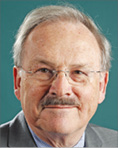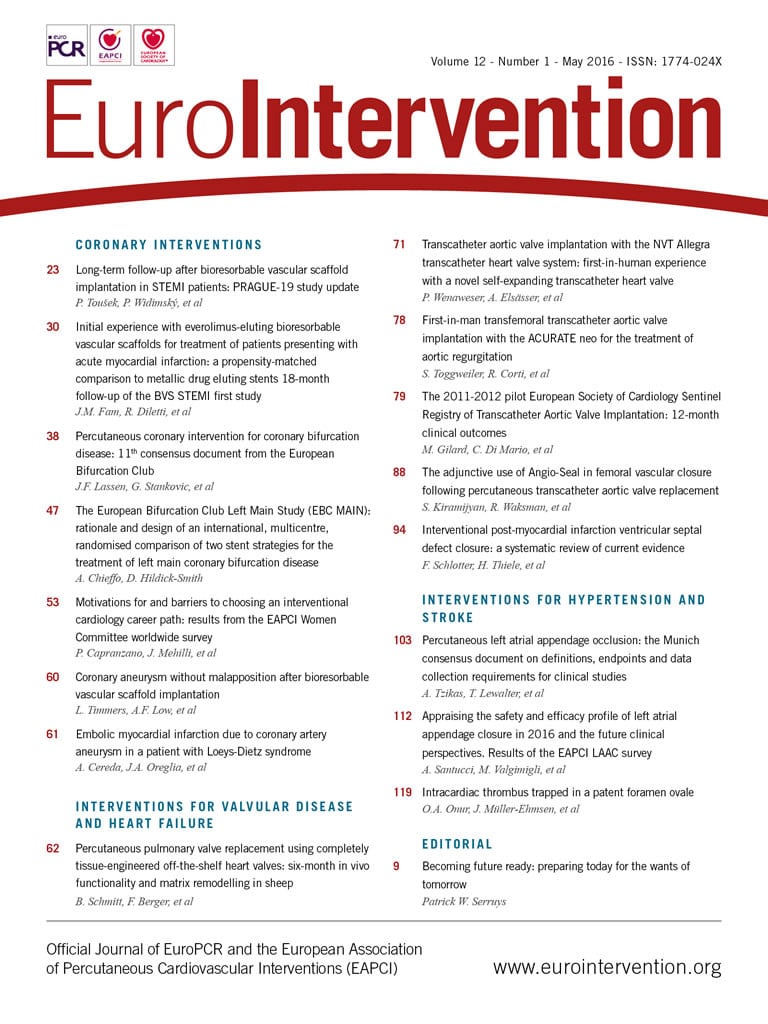
In the very first months of EuroIntervention we struggled with submissions as the journal was basically unknown to the wider world. We knew that we needed to establish an Editorial Board whose members had exceptional and established academic reputations to promote and guide us through the undiscovered paths that lay ahead. We were honoured and privileged to have, as Co-Editors, Jean-Pierre Bassand, Giancarlo Biamino, Antoine Lafont, Jean Marco, Marie-Claude Morice and William Wijns. The Deputy Editors were from Erasmus MC, Rotterdam: Pieter Kappetein, Wim van der Giessen and Marc van Sambeek. Jean Fajadet had the amazing foresight to suggest that we also publish thematic supplements (a novelty still unique to interventional cardiology journals) and, together with Bernard de Bruyne and Alec Vahanian, they became our Supplement Editors. As I write this editorial, I am struck by the thought that, having the input and guidance of this immensely strong group in our early days, is similar to having Lionel Messi, Neymar, Luis Suárez and also Ronaldo in our team. Our gratitude to them will always be sincere and everlasting: thanks to them, the early foundation they laid has led to the success of the Journal today.
The initial Editorial Board meetings were held once a month with a teleconference for the international members. Soon submissions started to increase as did the frequency of the meetings. However, it became increasingly difficult to have all international members participating at the same time, in part due to their various commitments. Eventually we all agreed that it was time to create the position of Associate Editor to shoulder the accumulating editorial burden. The initial group of Associate Editors came from Erasmus MC and they were selected for their particular fields of expertise, their number also including surgeons (another unique element for an interventional cardiology journal at that time), bioengineers, epidemiologists and statisticians. In addition, we invited the international fellows at Erasmus MC to join the group, knowing that these fellows would later become established interventionalists themselves and, also, as part of their training would understand the peer review process. Over the last few years, we have expanded the Associates to include International Associate Editors. These International Editors were selected on merit, as defined by the quality and timeliness of their reviews, and also in line with the EAPCI’s initiative to encourage and promote young interventionalists within our community.
Over the years, the membership of the Editorial Board has evolved to the Board we see today, including Pim de Feyter and Nico Bruining as Deputy Editors. The weekly board meetings have also progressively intensified, increasing in duration from the initial 60 minutes up to today’s 120 minutes. These meetings have become a regular source of interesting academic exchanges with sometimes heated, provocative debates which can only be beneficial to the peer review process.
Of our current Deputies, Pim will, in the future, gradually decrease his commitments to the Journal as I must too. Nico is, of course, an expert in invasive imaging and it has therefore become evident that we need to expand the Deputies whilst looking to the future. It is therefore my great honour, on behalf of the EAPCI and PCR, to announce today that Robert Byrne and Davide Capodanno have accepted the invitation to become Deputy Editors.
Robert is an Irish interventional cardiologist working at Deutsches Herzzentrum, Munich, who has received awards including the ESC Atherothrombosis Research Fellowship (2008), the TCT Young Investigator Award (2009) and the Andreas Grüntzig Research Prize of the German Cardiac Society (2016). He is a Board Member of the EAPCI as well as Co-Chair of its Scientific Documents Committee. Davide is an Associate Professor of Cardiology at the University of Catania and an interventional cardiologist at Ferrarotto Hospital, Catania, Italy. He is the recipient of six investigator awards for cardiology research, including the TCT Young Investigator Award (2011). He has been chair of the EAPCI New Initiatives for Young Interventionalists and the Co-Director or Associate Director of multiple courses, including the EAPCI Fellows Course and the PCR Clinical Research Course.
I would also like to welcome Ramzi Khamis from Imperial College London to the team as Translational Research Editor and invite you to read his maiden editorial in this issue.
As a former student of classical Greek, I hope that readers will concur that Aesop was not telling fables when he wrote, “it is thrifty to prepare today for the wants of tomorrow”.

